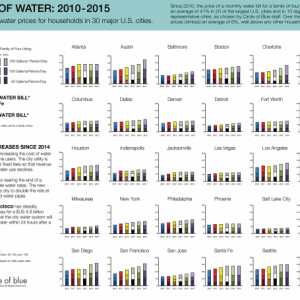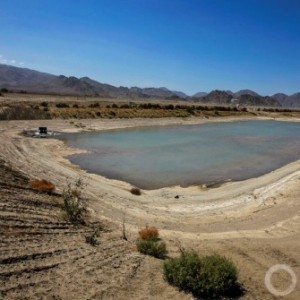Federal Water Tap, April 27: House Committee Approves $US 35 Billion in Water and Energy Funding
The Rundown
More money for the Army Corps of Engineers. Major deficiencies in environmental oversight in the U.S. Virgin Islands. Prize money for renewable-energy desalination and a potential source of funding for sewage treatment upgrades in the Great Lakes. EPA’s science board reviews drinking water contaminants and looks for new members. An EPA water infrastructure assessment is under review.
“This bill will help ensure the safety, security, and reliability of our nation’s nuclear stockpile, help drive this nation towards energy independence, and help improve the infrastructure that facilitates American commerce. It is a well-rounded, responsible bill, and I urge my colleagues to support it as it moves through the process,” — House Appropriations Committee Chairman Hal Rogers, on the budget for water and energy agencies that included a big bump for the Army Corps of Engineers.
By the Numbers
$US 200,000: Prize money for a renewable-energy desalination competition sponsored by the U.S. Agency for International Development and the Bureau of Reclamation, which was won by a team from MIT and Jain Irrigation Systems (Securing Water for Food)
$US 500 million: Funding to upgrade wastewater treatments plants in the Great Lakes region with technology to remove nutrients, according to legislation proposed by Rep. Brian Higgins (D-NY)
$US 112 million: Loans and grants awarded to rural communities to improve water and energy systems (U.S. Department of Agriculture)
Reports and Studies
Water-Energy Spending Bill
The House Appropriations Committee approved a $US 35.4 billion spending bill for water and energy programs in fiscal year 2016, a 3.5 percent increase.
Rebuking President Obama for requesting so little money for the Army Corps of Engineers, the committee increased funding for the builder of dams, locks, and levees by 17 percent above the president’s budget proposal, to $US 5.6 billion.
The committee agreed with the president’s request for $US 112 million for five Indian water rights settlements, but no funding was granted to a program to restore the San Joaquin River in California.
The bill includes a section that prohibits the Army Corps of Engineers from spending funds to implement the U.S. Environmental Protection Agency’s attempt to clarify the jurisdiction of the Clean Water Act.
The 198-page committee report includes every line item.
Environmental Trouble in Paradise
The U.S. Environmental Protection Agency should consider taking over the management of Clean Water Act programs in the U.S. Virgin Islands that have been handled by local authorities, according to a review by the EPA’s internal watchdog.
The Office of the Inspector General found that the Department of Planning and Natural Resources failed to conduct required water monitoring tests and one of the two major water utilities on the islands was improperly treating its water. The report found other gaps in monitoring water systems and underground chemical tanks, and a lack of enforcement for facilities that were in violation of water pollution standards.
News Briefs
Farm Conservation Programs
Farmers who receive taxpayer money to reduce the cost of crop insurance must comply with new standards to reduce land erosion and the draining of wetlands.
The 2014 farm bill made changes to federal programs that subsidize farmers. The U.S. Department of Agriculture issued an interim rule outlining the requirements, which a number of farmers are already subjected to if they receive money from other USDA programs.
Drinking Water Contaminants
A committee that consults with the U.S. Environmental Protection Agency on science will begin reviewing the agency’s list of drinking water contaminants that are not currently regulated by the federal government. At least five contaminants will be selected by the EPA for deeper analysis and potential regulation. The advisory committee will meet April 29-30 in Washington, D.C.
Coastal Ecosystems
Four sites — in Florida, Hawaii, Michigan, and Washington — were selected to be demonstration sites for large-scale environmental restoration projects. By reviving wetlands, coral reefs, and flood plains to help communities that rely on these resources better adapt to rising seas and more frequent floods.
On the Radar
Disaster Preparation
What to do when a power outage during a hurricane shuts down the sewage treatment plant, which happened in New Jersey after Hurricane Sandy? Better yet, how to prevent that from occurring? Today, the National Institute for Standards and Technology will release a disaster planning guide for communities. The goal: to avoid the failure of water grids, telecommunications, and other critical infrastructure during a calamity.
Clean Watersheds Needs Survey Update
The survey is under review by the White House Office of Management and Budget, according to EPA spokesman Robert Daguillard. Already delayed by more than a year, there is no scheduled release date, Daguillard wrote to Circle of Blue. Mandated by Congress, the survey assesses national spending required to meet the goals of the Clean Water Act.
Wanted: Science Advice
The U.S. Environmental Protection Agency is accepting nominations for six expert advisory committees, including the drinking water committee. These committees consult with the agency on the science behind the regulatory process. Nominations are being accepted through May 27.
Federal Water Tap is a weekly digest spotting trends in U.S. government water policy. To get more water news, follow Circle of Blue on Twitter and sign up for our newsletter.
Brett writes about agriculture, energy, infrastructure, and the politics and economics of water in the United States. He also writes the Federal Water Tap, Circle of Blue’s weekly digest of U.S. government water news. He is the winner of two Society of Environmental Journalists reporting awards, one of the top honors in American environmental journalism: first place for explanatory reporting for a series on septic system pollution in the United States(2016) and third place for beat reporting in a small market (2014). He received the Sierra Club’s Distinguished Service Award in 2018. Brett lives in Seattle, where he hikes the mountains and bakes pies. Contact Brett Walton






Leave a Reply
Want to join the discussion?Feel free to contribute!